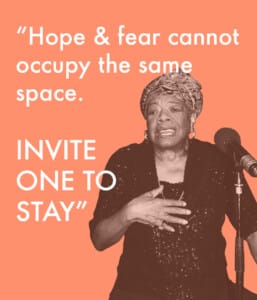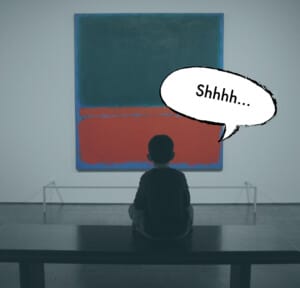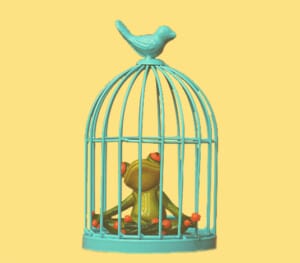Estimated reading time: 4 minutes
by Dr Jim Walsh, CEO of Conway Hall
For this to work I need you to go with me on something. Scared yet?
What I need to you to go with me on is the idea that hope is sometimes the opposite of fear. I also need your wider appreciation of ethics because within this opposition there is a real ethical issue.

The supreme Maya Angelou once said, “Hope and fear cannot occupy the same space”, which makes sense if they are opposites. Of course, to make her particular point, she added, “Invite one to stay.”
Personally, even in this world of constant sorrow, I invite hope to stay, and I encourage all of you to do likewise. Fear is always an unwelcome guest at my door whereas hope gets a free pass every time.
But what is hope? And, as one of my great mentors would say, “Where can I get some?”
Hope can arrive in many different forms. It can be optimism, aspiration, a positive outlook, the expectation of a good and just future. However, in line with my mentor’s provocation, I get mine from the ‘shop’ of art and culture.
Art and culture provide me with hope because they stretch the ‘humanly possible’, just as science and sport do likewise in their fields.* In my ‘culture-field’, I discover new ways of seeing, different ways of feeling, and an eloquence of articulation beyond measure for my own stuttering thoughts. Art, film, theatre, music, and literature have all at one time or another shown me the best in humanity and given me hope through their expression.

To travel alongside Sartre’s Roquentin as he strives to understand his nausea showed me that I wasn’t on my own in thinking how strange this world of things, colours and people can be.
To see the landscapes of New Mexico in Georgia O’Keeffe’s work fills my eyes and, it feels, my lungs with air, space and the beauty of stillness.
To hear Nina Simone sing – well anything really, but when forced to choose – Feeling Good, I know that I can find strength.
The sheer joy of Mozart’s overture to The Marriage of Figaro and tenderness found in Rothko’s silence constantly prove to me that I can find hope in a myriad of different places if I allow myself to open up and receive their gifts.
I could go on and list hundreds more, however, what’s more important is that you look to your own lists.

If hope is to be found in art and culture then, as the anonymous man at the back of the room says, “So what?” What is the point of highlighting where we might be able to find hope?
Ah, now that’s the interesting question, but first we have to crunch some numbers.
Did you know that in the year 2021-22, the UK government had a budget of £544 billion to spend across all the vast array of services it designates worthy enough to receive central funding? So, Health and Social Care received £189 billion (nearly 35%), Education got £75 billion (nearly 14%) and we can go all the way down the list of 23 sectors to get to International Trade with £0.52 billion and the HM Treasury with £0.41 billion. Among the 23, there are obviously a great many decisions, discussions, and strategies to be fulfilled.
My particularly beef is with a comparison between two… you can probably guess which two. The Orwellian sounding ministries hope and fear, otherwise known as the Department for Digital, Culture, Media and Sport and its counterpart of Defence, Law Officers’ and the, again Orwellian sounding, Single Intelligence Account.
Now, before we ensue, it must be said that I’m going to apply a massively broad brush. The hope I have been describing, culture, is caught up in a department of many – possibly it could be said where others might also find their hope (digital, media and/or sport).

With that acknowledged then, in 2021-22 the entire DCMS received £2.5 billion (0.5%) of the UK government’s budget. So, score 0.5% for hope. For fear, the score is 9.2%. Or, to put it another way, the UK Government seems to value the stemming of fear over 18 times more than the propagation of hope.
There now needs to be an interlude where my argument is taken outside and riddled with bullet holes by those who either take issue with my statistics, methodology of grouping government sectors, or bracketing of hope and fear.
Perhaps justifiably blood soaked and more akin to a slice of Swiss cheese, I’m going to allow my argument to crawl back in. My reason is not to defend any of the stats in particular, but to raise a question:
“Who is that decides how much funding fear prevention gets as opposed to the generation of hope?” I don’t believe I was ever consulted – nor, I dare say, were you. But then that’s what representational democracy is, isn’t it? We have to trust that those we vote for represent our best interests. So, maybe my question is wrong and it should rather be: “How can we persuade those in government to fund more hope?”
My answer today – because I know it could well be different tomorrow – is that culture, through the hope it provides unlike the protection-from-fear programme, shows that life can be different. Life can be shared. Life can be more than just existence. When fear and the attempt to control or remove it predominates, we plateau as individuals and as a society. The infinite possibilities within us ebb away to leave only the same existence today as was yesterday when culture is plastered over, ignored or removed.

Indeed, one of the scariest aspects to a focus upon fear is that it reduces us at every level.
Our wings get clipped, we can no longer fly, and the stage gets set for the next scene. Whether they are economic or, in the case of a focus upon fear, political leading to mental constructions, cages at all costs must be avoided. So, instead of propagating a programme of fear, we must all invite hope to stay, as Maya Angelou knew.
Find the story that speaks to you, listen to the music that moves you, drink in the art that fills you and never stop looking for new sources of hope in culture and returning to the old ones that nourish you and give you flight.
* Thank you Sarah Bakewell for giving us not only a wonderful book but also a succinct and perfectly pitched phrase.